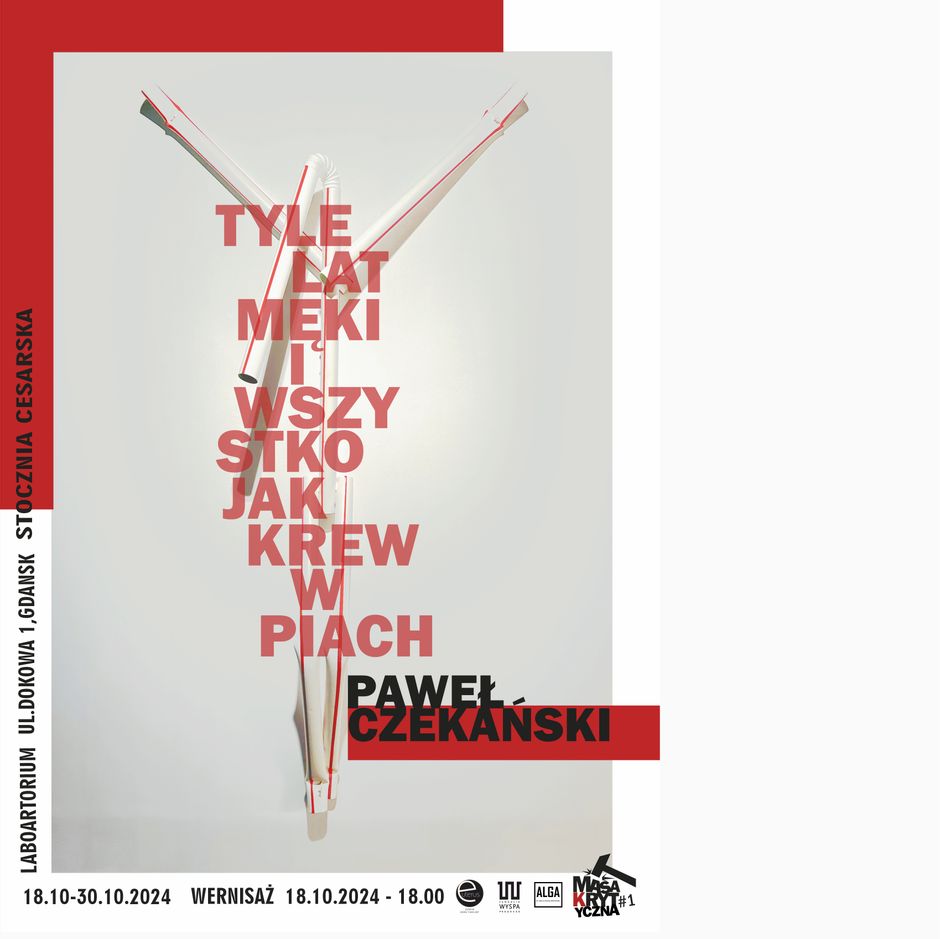Paweł Czekański/ So many years of suffering, all for naught
The exhibition is open daily from 12.00 to 18.00 except Mondays
The Wyspa Progress Foundation is a partner of the eUterus project in the implementation of Paweł Czekański's solo exhibition.
On June 4, 2023, by decision of the Artistic Council, Paweł Czekański was selected for the eUterus award in the form of an individual exhibition. The exhibition, titled "So many years of suffering, all for naught" is the implementation of the award summarizing the first edition of the Critical Mass exhibition, which took place at the Gdańsk Shipyard.
Reflecting on the contemporary sanctioning of iconography, one might conclude that its shaping is based on entirely different principles than those we observed before the 20th century. The media-market re-evaluations, the result of which and its recognizability largely become equivalent to the amount spent on it, based on the surreal multi-voice media landscape we have been experiencing for about 60 years, largely reduces itself to diverse components representing nothing more than a product. To what extent, however, do sanctioned images remain merely product representations, and to what extent do they attempt to annex reality?
A brand, logo, specific items — as visual stimuli that drive their popularity through consumers' desire to belong to a particular social group — also become expressions of specific ideas. Undoubtedly, within this discourse, we can include the plastic straw, which has become a sort of symbol of acceleration and modernity under the banner of capitalism, a theme skillfully explored in the work of Paweł Czekański. This Wrocław-based artist often draws upon culturally established images, leveraging their symbolic capital to create ironic narratives about the deficiencies of humanity.
Their soil is still rich enough for this. But one day this soil will be poor and tame, and no tall tree will be able to grow from it anymore.
Beware! The time approaches when human beings no longer launch the arrow of their longing beyond the human, and the string of their bow will have forgotten how to whir!
I say to you: one must still have chaos in oneself in order to give birth to a dancing star.
I say to you: you still have chaos in you.
Beware! The time approaches when human beings will no longer give birth to a dancing star.
Beware! The time of the most contemptible human is coming, the one who can no longer have contempt for himself.
Friedrich Nietzsche, Thus Spoke Zarathustra, translated by Adrian del Caro, Cambridge 2006, 9.
Nietzsche encourages people to reflect on themselves. Humans ought to ask holistic, complete questions: why? and what for? They must understand humankind is not able to get on the right path without help. At the same time, Nietzsche draws attention to the fact that the right path is not directed by any sort of divine power. Under the concepts of holiness, there is corruption and decadence, which govern the world. Humans cannot trust that the world is in good hands, that God is steering it and that, on his initiative, people are wise and act accordingly.
To a large extent the entire history of culture is based on the mankind dealing with the issue of our mortality.
There are plenty of myths, legends and rituals that aim to stave off the fear of death. Today the Apocalypse has become another political tool.
Late capitalism neglects the cultural fear of death by overproduction and popularisation of content related to the end of the world. Nowadays we can see that the system, in which we live, has stopped being functional. It is built on values such as profit, progress and development. We observe disturbing provisionality of our world, which seemed perfect before. More and more of its flaws are becoming evident and we come to a conclusion that the system is guilty of many problems of the contemporary. The end of the world, sudden, spectacular cataclysm has fascinated us since the dawn of time. Nevertheless, this violent end is way less likely to happen than the slow, gradual collapse of the world as we knew it so far.
At the same time, as Sartre points out, existentialism, according to which the works in the exhibition were created, is not primarily aimed at atheism and demonstrating the non-existence of God. He claims that even if God had existed, nothing would have changed. Belief in the existence of God is not the most crucial issue. The most important thing is man and understanding his essence.
Paweł Czekański
Born in Lubin in 1989. He graduated from Sculpture in The Painting and Sculpture Department of the Academy of Fine Arts Eugeniusz Geppert in Wrocław in 2014. He defended his PhD thesis in 2023. Since 2018 he has been a lecturer in The Faculty of Sculpture and Art Mediation of the Academy of Fine Arts in Wrocław. He is an author of installations, sculptures, films and photographs. Among other places, his works have been exhibited in BWA Wrocław Główny, Galeria Sztuki Współczesnej in Opole, Centrum Rzeźby Polskiej in Orońsk, Royal Scottish Academy in Edinburgh, Dishman Art Museum in Beaumont, USA and Gallery Rathaus Johannisthal in Berlin. He had been nominated for the Warto 2022 Prize in the cathegory of visual arts. Works and lives in Wrocław.
Organization: eUterus, Wyspa Progress Fundation
